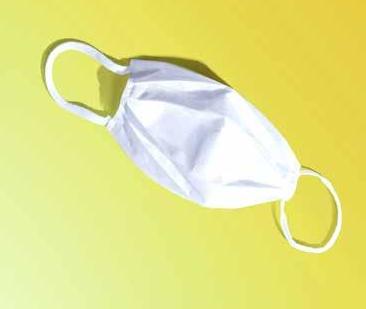
4 minute read
UNMASKING THE FACTS

UNMASKING the Facts What We’ve Learned So Far About Covid-19
Advertisement
by Ramona Shires, ND, RDN
We’re experiencing a significant problem in today’s healthcare landscape: too much information. When “Dr. Google” and even social media have become primary sources of medical guidance for many people, filtering fact from fiction is hard. How are we supposed to know how to keep ourselves healthy—especially now, in a pandemic? Here’s what we know right now about Covid-19, and some information that’s important to understand when making decisions about our health and safety.

Mask or No Mask?
Face covers, like masks and shields, are routinely used in medical practice to protect both the wearer and the patient from infec- tion. But they weren’t common in surgery and general hospitals until 1910.
The first time the public used masks to prevent the spread of virus was during the Manchurian plague of 1910–11 and the influenza pandemic of 1918–19, when covering the mouth, nose and beard became a means of protecting medical workers and patients from infectious diseases outside the operating room. During the influenza pandemic, mask wearing was mandatory for police, medical workers and even residents in some U.S. cities, but it was often controversial. Unbelievably, we’re experiencing the same controversy 100 years later.
The first use of surgical masks was in German and American operating rooms in the 1920s. They were developed to protect patients by containing and filtering droplets of microorganisms expelled from the mouth and nose of healthcare workers during surgery. Since coronaviruses like Covid-19 are spread through droplets, common sense tells us that wearing masks is one of our best lines of defense.
The Science behind Hand Washing
Coronavirus is an “enveloped virus”—that is, it has a protective outer layer. The layer’s molecules are shaped like a tadpole, with a water-loving (hydrophilic) round head and a water-hating (hydrophobic) tail. Because soap molecules have this same tadpole shape, coronavirus molecules are strongly attracted to soap molecules. Soap kills coronavirus by disrupting its protective outer layer and dissolving it in running water. That’s why the medical community strongly advocates for hand washing as a way to prevent the spread of coronavirus
Hydroxychloroquine, Treatment and Vaccines
There has been a lot of conflicting information on what treatments are best for Covid-19. What we know is that Covid-19 is different from common viruses like flu and hepatitis, and so the treatments for Covid-19 need to be different too.
The National Heart, Lung and Blood Institute’s ORCHID study compares the outcomes of hospitalized Covid-19 patients treated with hydroxychloroquine to those treated with placebos. As of June 20, data from this study have shown no additional benefit for the patients treated with hydroxychloroquine.
So if that’s not the best treatment for Covid-19, what is? Investigators are finding that antiviral medicines, such as Remdesivir, are increasing the survival rate of hospitalized Covid patients requiring supplemental oxygen.
Meanwhile, vaccine research continues.
When researchers compared the genome of Covid-19 to those of other coronaviruses, they identified two proteins that are unique to COVID-19 and two other deadly coronavirus strains, SARS-CoV and MERS-CoV. In all three strains, those proteins correspond with a high fatality rate and are thought to help the virus move from animal to human hosts. Researchers are currently working on vaccines that would target one of those two proteins.
The Best Defense against Covid-19
The first line of defense against Covid-19 is a healthy immune system. Talk to a nutritionist or holistic doctor about which vitamins and minerals are best for supporting immune function.
Next is good hygiene. Wash your hands often to kill any virus droplets you may have picked up.
Wearing a mask is advisable for two reasons: It will reduce the chance of you spreading or inhaling virus droplets, and it will prevent you from unconsciously putting your hands in your mouth.
Finally, try to reduce the frequency, intensity and duration of possible exposure to the virus. Making short trips to the store, with as few people around you as possible and in as large an airspace as possible, helps keep your exposure to a minimum.
Naturopathic doctor Ramona Shires is a licensed dietitian/nutritionist with Vitality Worx, located at 4590 Isabella Ingram Dr., Pensacola, FL. For information or appointments, call 850-361-8995 or email DrShires@Vitality-Worx.com. See ad, page xx.
Learn More from these Resources
National Center for Biotechnology Information: ncbi.nlm.nih.gov/sars-cov-2/
HopkinsMedicine.org: 2019 Novel Coronavirus Myth Versus- act
NationalGeographic.com: Handwashing Once Controversial Medical-Advice Ramona Shires
When you arise in the morning, think of what a precious privilege it is to be alive—to breathe, to think, to enjoy, to love. ~Marcus Aurelius
Early detection can mean life.

Breast thermography is one of the easiest and safest methods for spotting inflammation, a major precursor to disease. It offers earlier detection of breast disease than self examination, doctor examination or mammography.
NON-INVASIVE | RADIATION-FREE | HIGHLY EFFECTIVE NO COMPRESSION | FDA REGISTERED Thermography Advantage
Mobile & Foley, AL | Pensacola & Destin, FL | Brandon & Hattiesburg, MS | Covington, LA Carolyn Olson, Founder and Certified Clinical Thermographer CALL US TODAY: 251-623-2225 Learn more at ThermographyAdvantage.com








